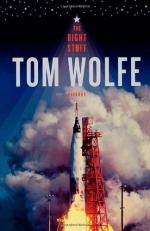|
This section contains 655 words (approx. 2 pages at 400 words per page) |

|
The Right Stuff Summary & Study Guide Description
The Right Stuff Summary & Study Guide includes comprehensive information and analysis to help you understand the book. This study guide contains the following sections:
This detailed literature summary also contains Literary Precedents and a Free Quiz on The Right Stuff by Tom Wolfe.
Test pilots may be the cockiest, most arrogant young men in the world. While at every stage of their training candidates quit, wash out or die, those who persist begin to recognize and live by an unspoken set of standards and assumptions summed up as having "the right stuff." Their wives are subject to the unwritten rules and standards, as well, and they comprehend the very good chance that their husbands may die. It is understood that part of military service involves early sacrifices for later rewards. For the pilots, the greatest reward is to be chosen to test planes at Muroc (later Edwards) Air Base. The planes that fly the fastest and highest are tested by the best pilots, and in the late forties and fifties, the best of the best is Chuck Yeager.
Despite rumors that it is impossible to fly faster than the speed of sound, Yeager breaks the sound barrier. In the post-war, Cold War paranoia, the Army orders that this achievement should be kept secret. The country's fear of the Russians is great and growing. Under the direction of their anonymous Chief Designer, the Russians have launched the first orbiting satellite and America lives in fear of what the Russians could drop on. Although the pilots at Edwards keep going higher and faster in ships they both pilot and land, President Eisenhower orders a hurry-up program to get a man into space. This is seen as an engineering problem. Any man shot into space will be a mere passenger: a test subject with no control of the capsule. Therefore, although the new program brings together the country's best test pilots, in asking for volunteers, the Army is not optimistic that type will find test pilots for this program. To their surprise, the overwhelming majority of the pilots see this as a call to hazardous duty, and many volunteer. Since they will not actually be flying the capsule, the remaining Edwards pilots ridicule them, calling them "Spam in a can."
The volunteers are whittled down to seven. On the day of their first press conference, although they have done nothing yet, they are treated as combat heroes. Most of the pilots, afraid of saying something which would damage their careers, are tightlipped, but the sole Marine, John Glenn, eloquently answers questions about God and family. He charms the press, who assume he speaks for all pilots, now called "astronauts." In reality, the astronauts are fiercely competitive and believe the first man up will be the one who goes down in history. When a peer vote sends Shepard first, Grissom and Glenn are forced to accept minor roles. Grissom gets the second flight, but he appears to panic after landing and loses his capsule. To everyone's amazement, it is Glenn's first American orbit of Earth that triggers the most intense public response, with cheering crowds and ticker-tape parades. Suddenly the astronauts are idolized, and are given gifts and goodies to sweeten their meager service salaries. The Edwards test pilots find it inexplicable, since they are flying nearly as high as the astronauts, nearly as fast, and landing their own crafts on dry land, but the general public does not seem to notice.
Gradually, the astronauts add features to the space capsule, which give them more control of the craft. When the automatic systems fail on his flight, Gordon Cooper, the final Mercury astronaut, is able to pilot his capsule back entirely under manual control. The army is hoping to establish a purely military space program, but the plane that is its greatest hope proves hopeless at high altitudes and nearly kills Yeager in the process. The mood of the country has changed; the Russians are no longer seen as an immediate threat. The Gemini and Apollo programs continue, but astronauts are no longer seen as single combat warriors facing death for the United States and their status fades.
Read more from the Study Guide
|
This section contains 655 words (approx. 2 pages at 400 words per page) |

|



